Study abroad: more places you’ll go!
The Justice asked students questions over email regarding their fall study abroad experiences amidst the pandemic.
According to the Brandeis Office of Study Abroad, 19 Brandeis students studied abroad this summer, 60 Brandeis students are studying in 19 countries this fall and by this spring, more than 100 Brandeis students are expected to study abroad. Special thanks to Study Abroad Advisor, Ari Massefski and the Office of Study Abroad for their assistance in contacting students currently studying abroad for this article and for providing demographic information.
Neelie Kaifer ’22
London, United Kingdom
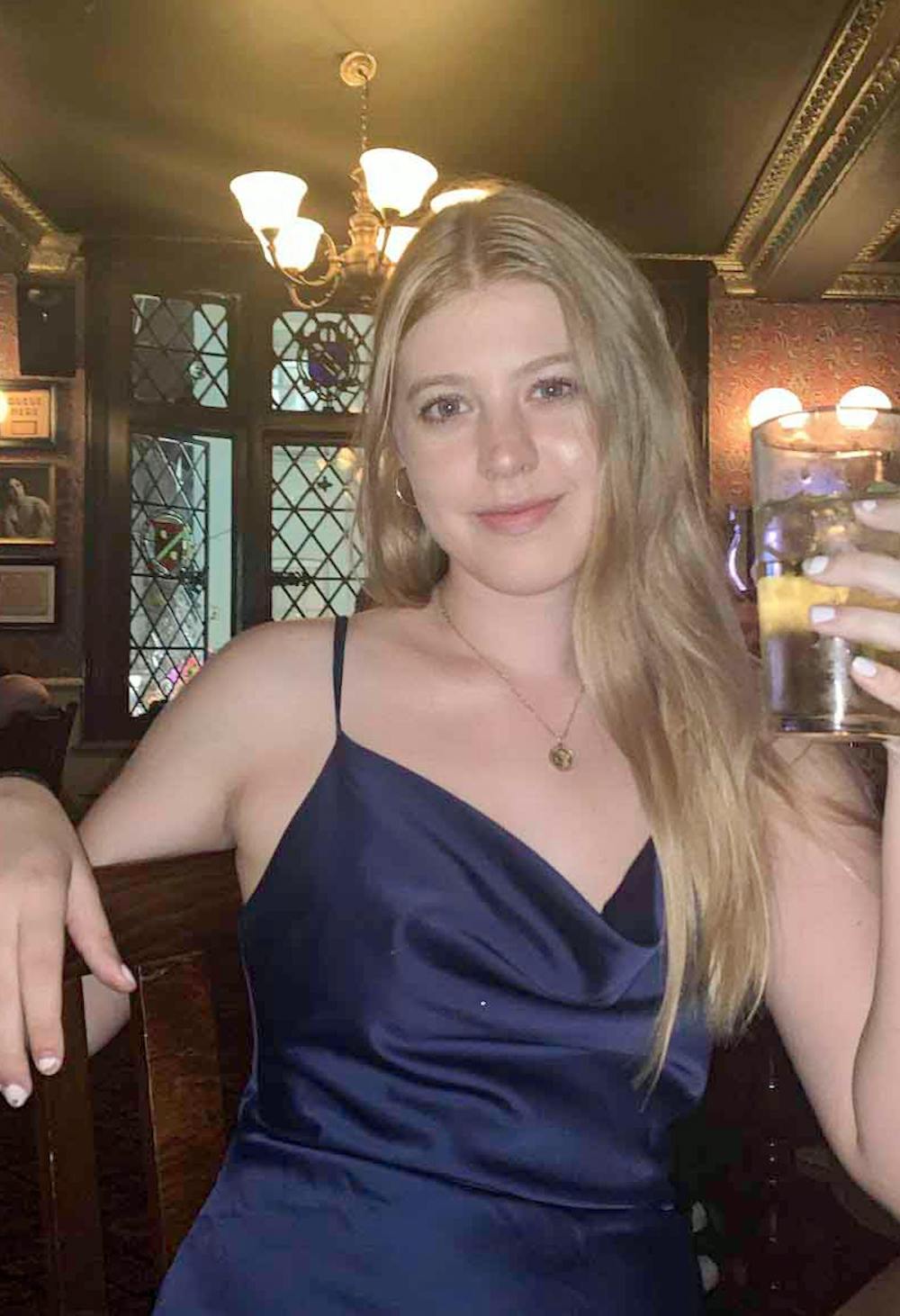
Q: Can you tell me a little bit about the program you are in?
A: I am on the Boston University London internship program, on the Psychology and Health Sciences track. During the first five weeks of the program, I completed two courses. For the rest of the weeks I am here, I am doing an internship four days a week as well as a separate extracurricular course that meets once a week — it sounds like a lot but is actually very manageable.
Q: What are your academic interests and pursuits? Describe a favorite course that you’re taking or a course that intrigues you.
A: I am a double major in HSSP and Sociology. A course that I took that interested me was an art history course that looked at how arts and media in post-war Britain were reflective of the greater culture at the time — we frequently discussed what made an artwork “British.” I’ve never really thought about the intersection between art and sociology before [and there’s] actually a big connection between the two subjects.
Q: What has been the most memorable aspect of your time abroad so far?
A: My favorite thing to do is walk around the city and explore local markets and restaurants with my friends. I was also lucky enough to visit Edinburgh for a weekend, and it was so beautiful, and it had a completely different feel from London.
Q: How has COVID-19 impacted your study abroad program?
A: Traveling to other countries outside of the U.K. is more difficult, which is disappointing because I was hoping to visit other places, but it does allow me to explore other parts of the U.K., which I may not have done without the travel restrictions. England is less restrictive than other parts of the U.K. like Scotland or Wales, so masks are optional pretty much everywhere except public transport. However, a decent amount of people still don’t wear masks despite it being mandatory. Masks feel like the only COVID-19 prevention I have seen, apart from the optional National Health Service QR code scan in at restaurants (which I cannot do because I am not a part of the NHS).
Q: What have you found to be the biggest difficulty or obstacle you’ve had to overcome so far?
A: I haven’t found it that difficult. There is obviously a bit of a cultural shock at first, but now it doesn’t seem different at all. The hardest thing for me has been trying to stay in touch with friends and family because of the time difference. My younger siblings go to school all day, and I can’t talk to them throughout the day like I do at home.
Q: What have you enjoyed most about the country you are living in? Is there a specific part of the culture that stands out to you?
A: What I love most about London is the atmosphere. The city is very busy and people are always going somewhere and doing something. There [are] also so many parks, museums and cafés that allow you to slow down and escape the chaos of the rest of the city. Some streets have beautifully colored old buildings and cobblestones, and I try to turn down those streets whenever I can. There’s always something to do for whatever mood you are in.
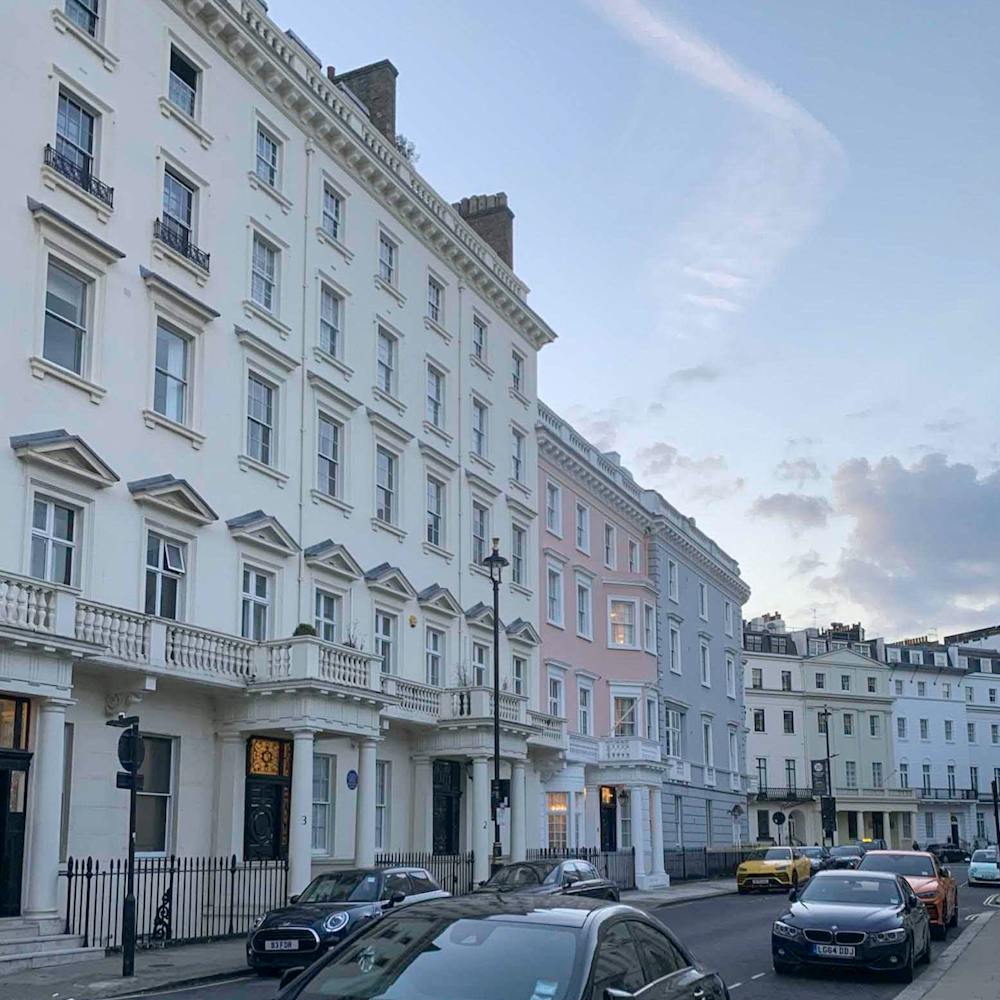
Evening view: Kaifer takes a photo of a street with pastel-colored houses in the evening.
Jacob Keller ’22
Merida, Mexico
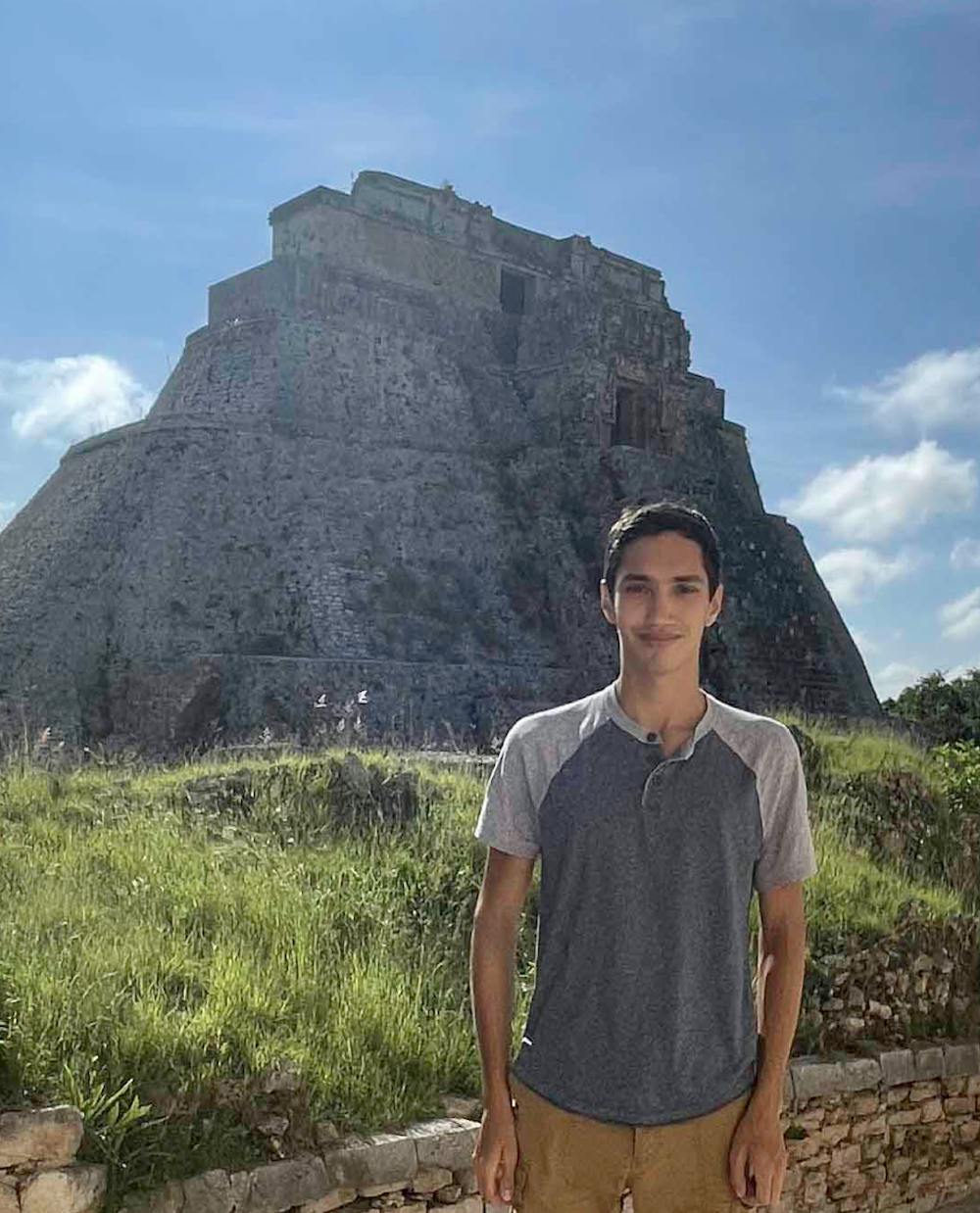
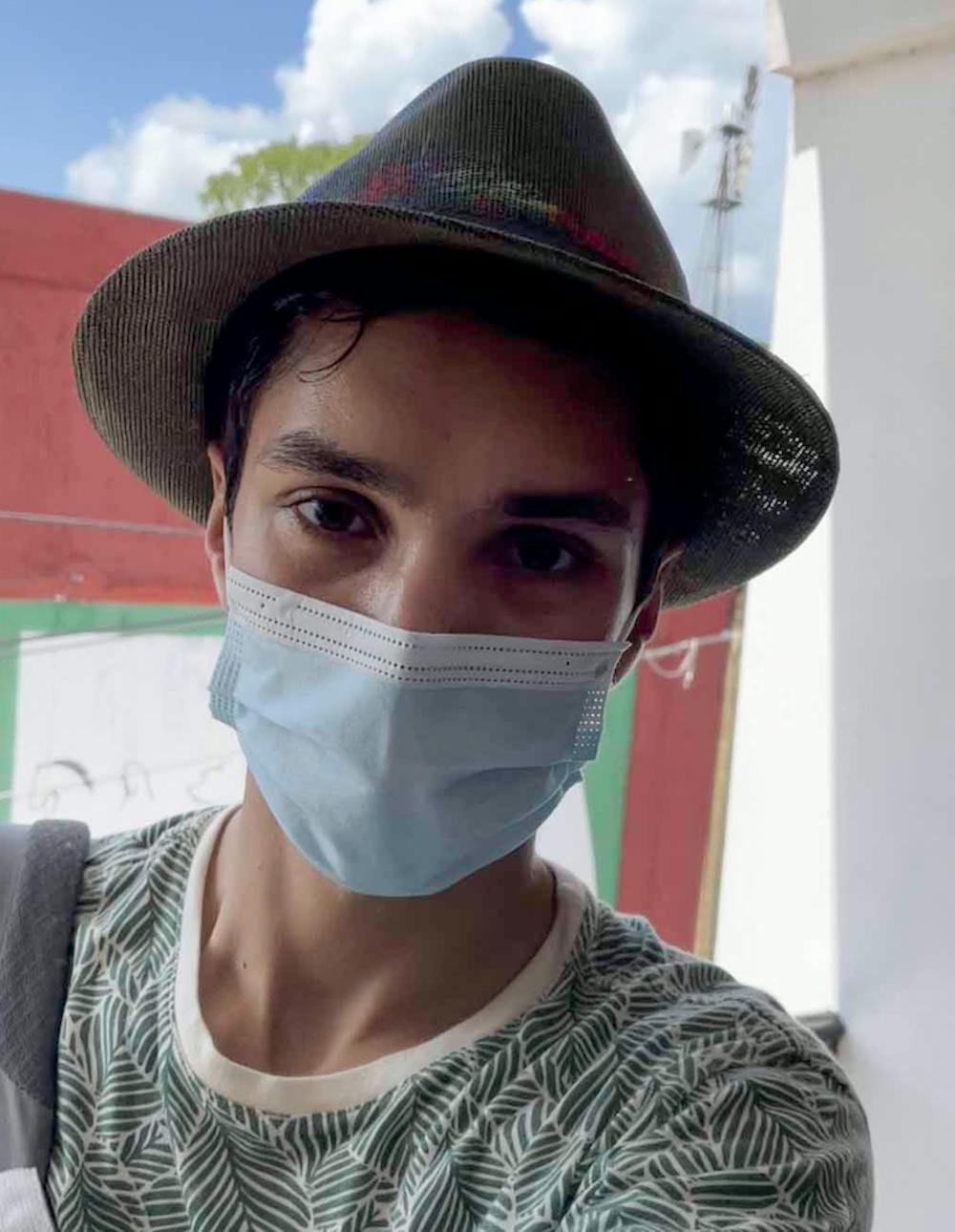
Hat: Keller takes a selfie in a hand painted hat.
Q: Can you tell me a little bit about the program you are in?
A: My program is [the] Mérida Universities Program with IFSA (Institute for Study Abroad). Shoutout to Tania and Diana! I am in Mérida, Yucatán, Mexico in the southeast part of the country. I’m taking five classes here [and] the local universities couldn’t host exchange students this semester, but local professors from UADY (Universidad Autónoma de Yucatán) come to the office each day to teach us. All of our classes are in Spanish, and I’m just with the people on our program — there are 21 of us. My classes, [which] are generally in the social sciences, [are] two hours long and we have them twice a week. There’s a good amount of free time, and a lot of students use it to go to local cafes. There’s one that’s especially popular with our program called NyNy (like New York, New York).
Q: What are your academic interests and pursuits? Describe a favorite course that you’re taking, or a course that intrigues you.
A: At Brandeis I’m a Sociology and Business double major. I especially enjoy learning about different cultures, history and archaeology. One of my favorite courses here is “Globalization and Economic Challenges in Latin America.” In this course we talk about the role that the West,especially the U.S., has played in the Mexican economy, especially beginning with the 1980s. During this decade, a lot of neoliberal policies were instituted by Mexican politicians who were educated in the US.
Another class that’s really interesting is my “Racism and Discrimination” class. One of the things we talked about was a research project my professor did, where she conducted an experiment in her class of local students about their views of race.
Q: What has been the most memorable aspect of your time abroad so far?
A: This Saturday (Oct. 23), I met a local guy on a dating app and [we] visited the Grand Museum of the Mayan World. After, we went to a mall to get Mayan chocolate from a place called Ki ́Xocolatl and then met up with his friends to get cheeseburgers. [Then] we went to his friend’s house to play cards and chat. I remember pausing while I was there and simply feeling integrated into the country.
Q: How has COVID-19 impacted your study abroad program?
A: Mérida is a city that’s coming out of COVID-19. When we first arrived, the city had a curfew. A couple of weeks later, the curfew [stopped], and the city reopened. Since then a lot of the nightlife has returned. Bars and restaurants are open.
One of the suggestions we’re strongly encouraged to follow is to not take buses in the city center because they’re always packed with people. It’s easy enough to use Uber or an app called DiDi.
Q: What have you found to be the biggest difficulty or obstacle you’ve had to overcome so far?
A: My adjustment process has been a little funny. When you take all of your classes with Americans, it’s easy to forget that you’re not in the U.S. Also, I don’t think I’ve fully processed that I’m in Mexico [because] a lot of English is spoken here and you’ll find [stores like] McDonald’s, Starbucks, Walmart, Costco, etc. But, I think the more time I spend with locals the more it will sink in that I’m here.
I think the biggest difficulty that I’ve run into here is finding the path that suits me best. I started my time here trying to spend as much time as I could with the other students on my program. I soon came to realize that in order to make the most of my time here, I had to branch out of my comfort zone. That’s how I ended up at a local’s house to play cards — and lose.
Q: What have you enjoyed most about the country you are living in? Is there a specific part of the culture that stands out to you?
A: The thing that I’ve enjoyed most about living in Mexico is spending time with Mexicans. It’s a treasure to hear the perspectives of a local. Mérida is a city with a lot of beauty and a lot of inequality. It’s been really interesting to talk with locals about why they think that’s the case and if they think it’s going to change. It’s also fun to learn about the less talked about cultural events, like the drag shows.
Q: What have you learned so far about the culture you have been immersed in (something that a tourist wouldn’t know, but a local would)?
A: I think that tourists miss out on certain local cultural events or restaurants frequented by locals. Lesser-known places such as El Nuevo Tucho are a lot of fun. They have comedians and singers every night, and it’s a place where young couples, families with young kids and people who I imagine are grandparents go. [When I went], everyone was laughing, and the atmosphere was light.
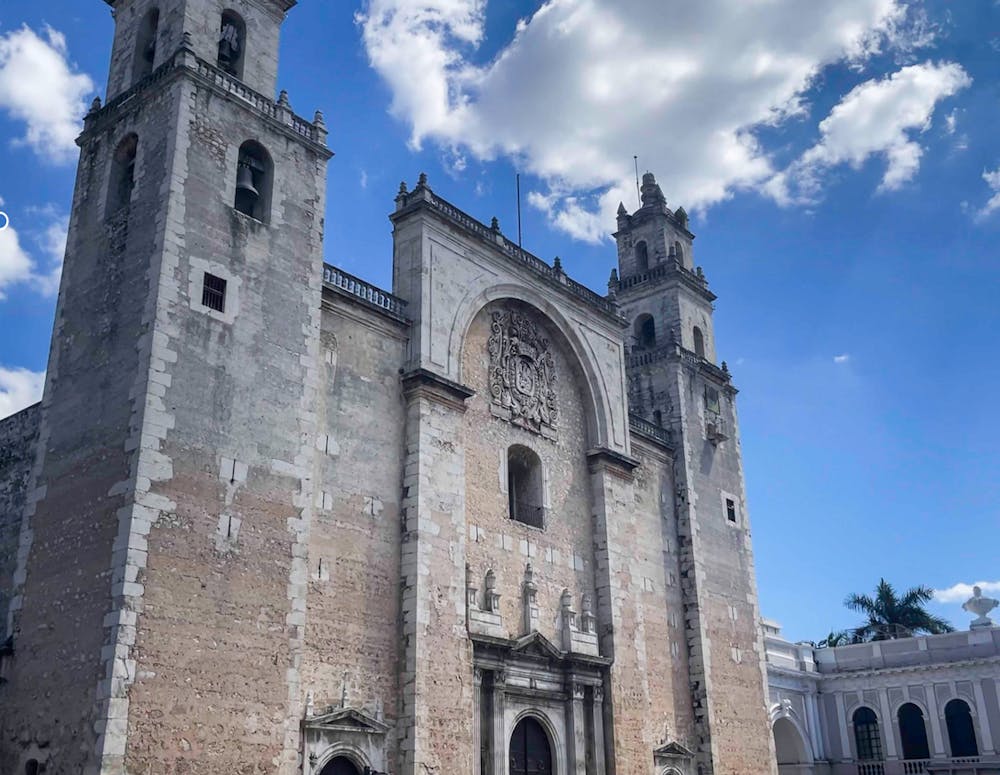
Catedral: Keller takes a photo of the Catedral de San Ildefonso in Mérida.
Lainey Solomon ’22
Paris, France
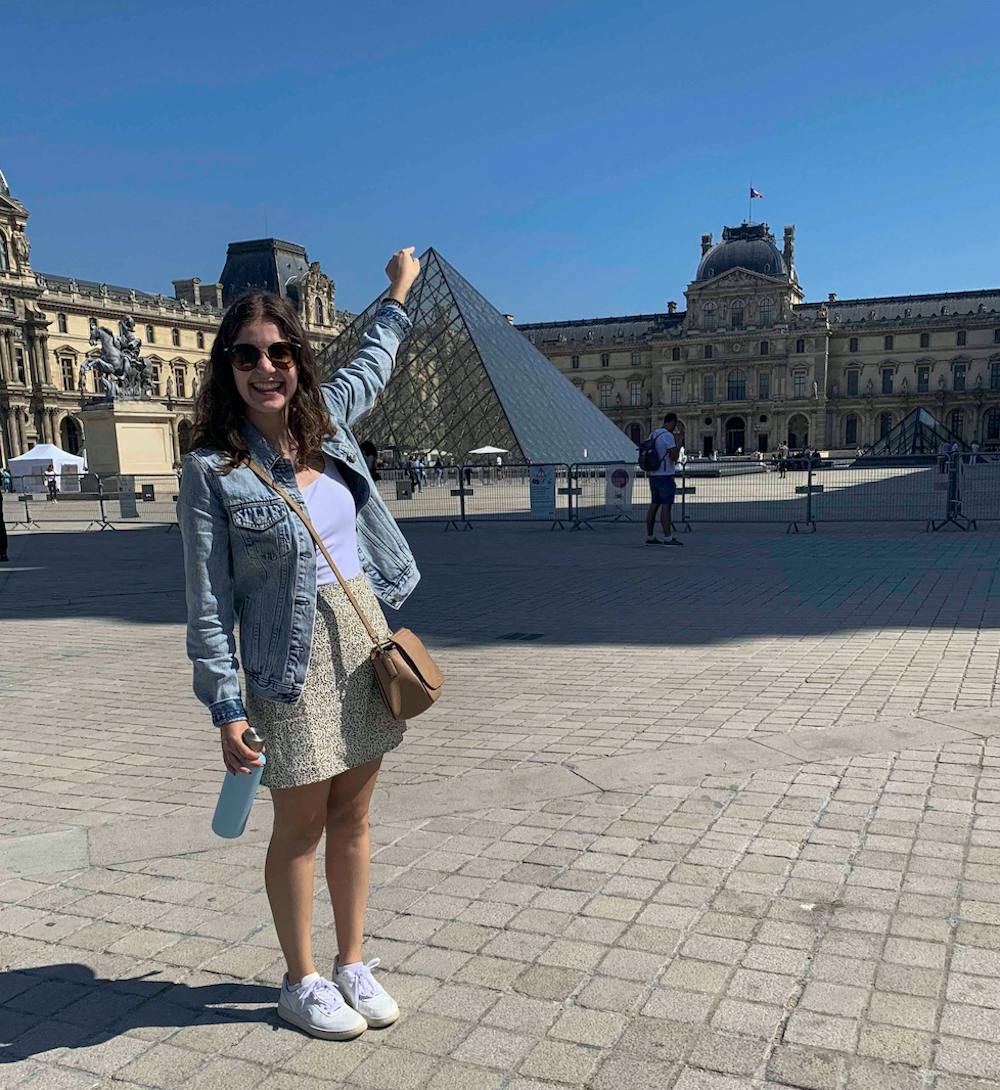
Q: Can you tell me a little bit about the program you are in?
A: I am studying with Academic Programs Abroad in Paris. APA is a French immersion program, so I am living with a host family and taking all of my classes in French. Some of my classes are with the APA cohort, and some of my classes are at University Paris 8. APA is a cultural immersion program as well. Every week they have a cultural event planned for us like a ballet, opera, cheese tasting, etc., and we have gone on weekend trips to Normandy and Dijon.
Q: What are your academic interests and pursuits? Describe a favorite course that you’re taking or a course that intrigues you.
A: I am a Chemistry and French double major. I really love education, and I plan on becoming a high school teacher in the future. My favorite course I’m taking right now is called “Race, Genre, et Identités Postcoloniales en France” (Race, Gender, and Identities in Post-colonial France). The class is very interactive — we discuss the readings, have debates and also explore areas around Paris that help us learn more about the subject. So far, we have visited Le Musée d’Immigration (Immigration Museum), toured La Mosquée De Paris (a famous mosque in Paris) and had Dorra Mameri (a researcher and sociologist) come to discuss secularism in France.
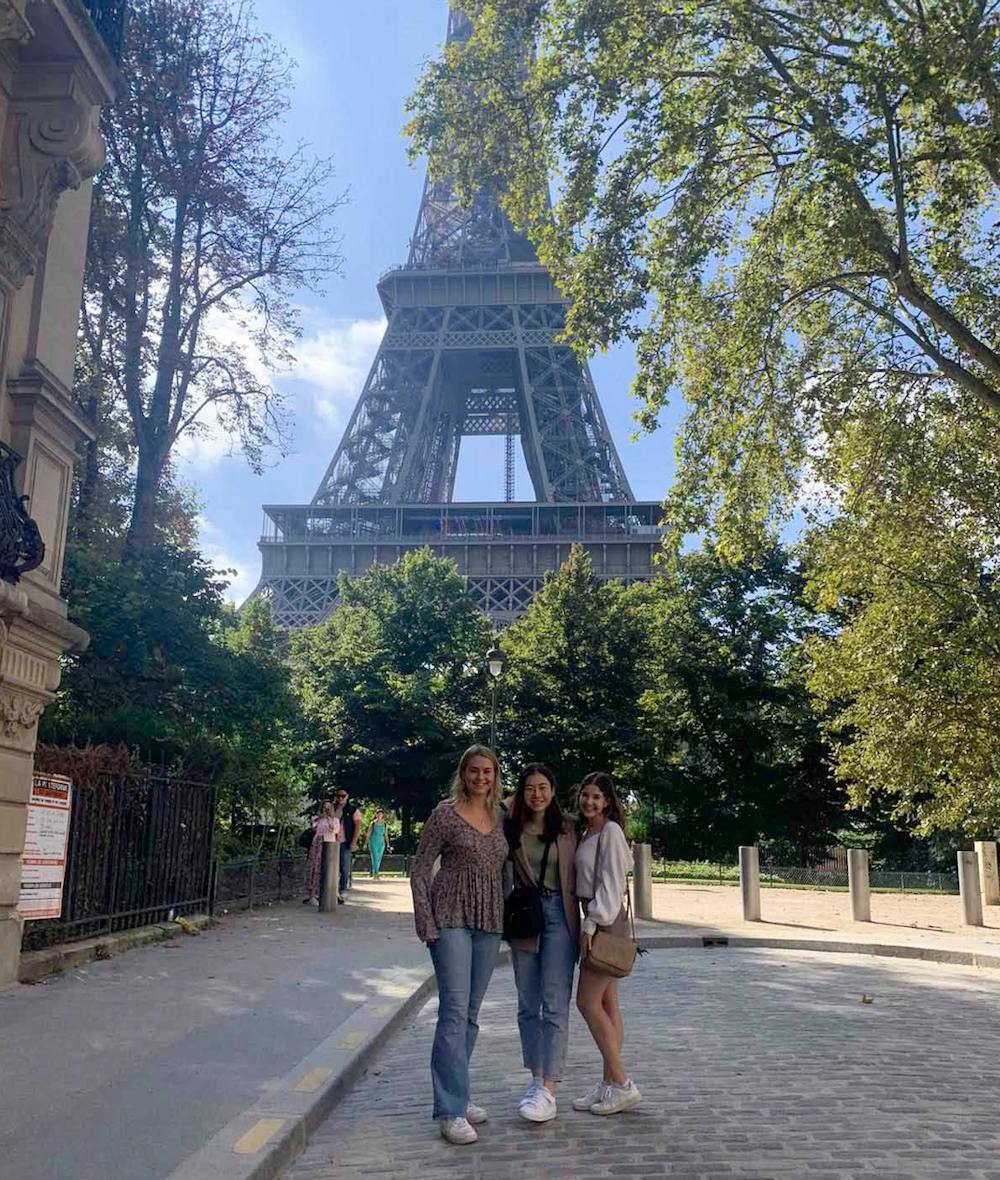
Eiffel tower: Solomon stands in front of the Eiffel Tower for a picture with friends.
Q: What has been the most memorable aspect of your time abroad so far?
A: The first week here has been the most memorable. It reminded me of Brandeis Orientation because we were busy doing activities every day, and I was able to get really close with the people on my program. The first week we were all in a hotel together because we didn’t move in with our host families yet. We had guided tours around neighborhoods and monuments, meals all together at delicious restaurants and fun team-building events — we did a scavenger hunt around the Louvre and an escape room game all in French.
Q: How has COVID-19 impacted your study abroad program?
A: Luckily France is handling COVID-19 very well because vaccines are mandatory to enter any restaurant, museum, theater [or] bar. It feels very safe here and besides wearing a mask [while] indoors, my experience hasn’t been hindered by COVID-19 at all.
Q: What have you found to be the biggest difficulty or obstacle you’ve had to overcome so far?
A: The most difficult thing has been adjusting to speaking French the majority of the day and also adapting to living with a host family. When I first moved in with my host family, it was an adjustment in terms of the rules and habits of the family, which differed somewhat from my family’s. For example, people in France eat dinner very late — around 9/9:30 pm.
Q: What have you enjoyed most about the country you are living in? Is there a specific part of the culture that stands out to you?
A: It may be basic to say this, but I have to say the food! I joke with my friends that I eat an average of 4 baguettes a day — which is an exaggeration, it’s probably closer to 1.5. I also really love that people take the time and sit to eat. Even in the middle of the day, French schools close for 1-2 hours so children can go home and have a proper meal. I have been enjoying sitting with my host family for meals instead of rushing to eat so that I can get back to work — which I tend to do a lot at Brandeis.
Q: What have you learned so far about the culture you have been immersed in (something that a tourist wouldn’t know, but a local would)?
A: You do not smile or make eye contact with people you don’t know. As an American, I was so used to smiling at people when I walked down the street and making small talk but I learned that if you smile at people, they will think that you know them or that you are trying to be friends with them — especially on the metro.
Lucy Mayer ’22
Granada, Spain
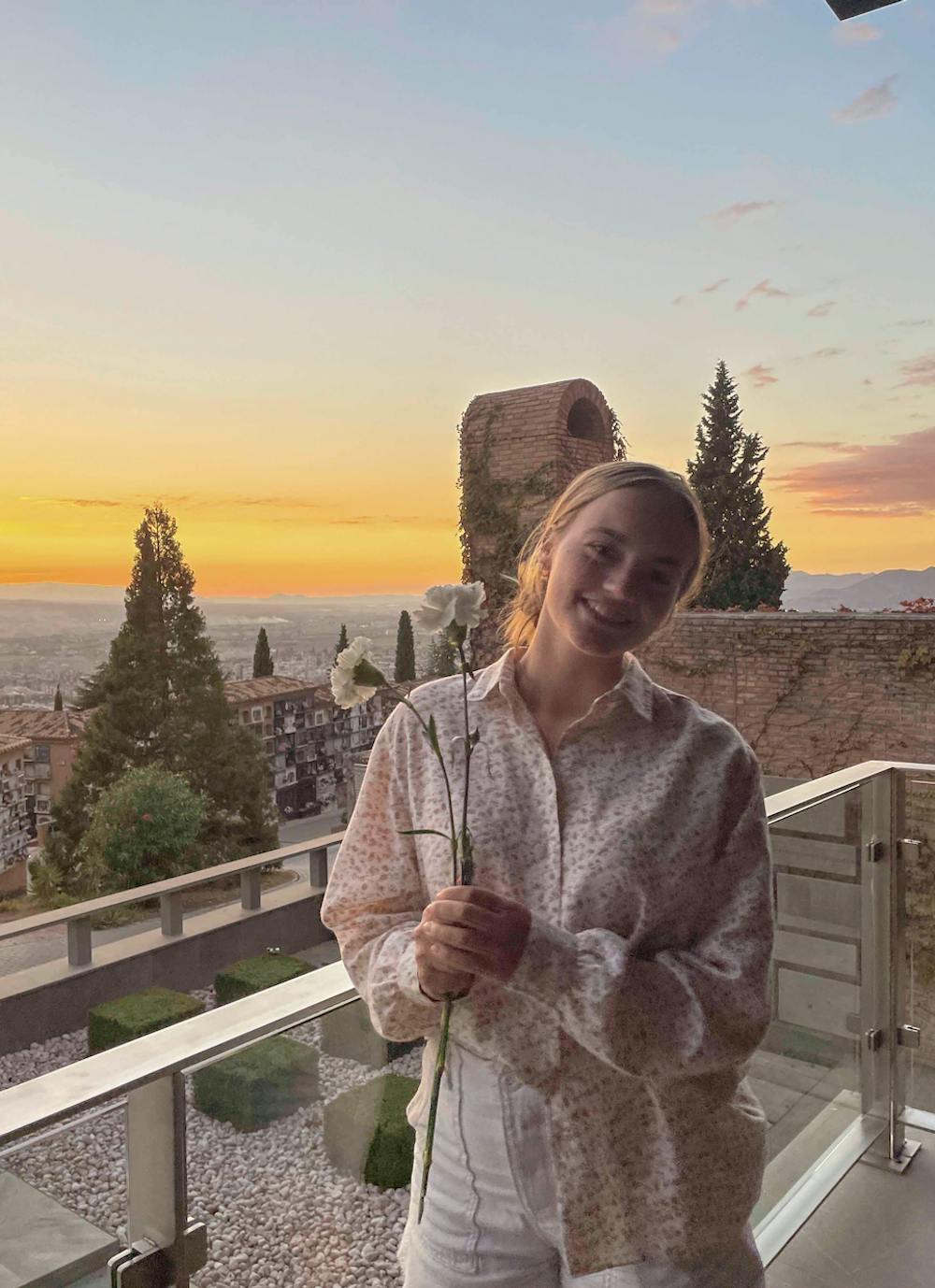
Q: Can you tell me a little bit about the program you are in?
A: I am studying abroad in Spain this fall through the IES (Institute for the International Education of Students) Granada program! My program offers quite a variety of courses. I am taking an “Islamic Art and Architecture” class, a flamenco dance class, a watercolor class and a “Mediterranean Ecosystems” class. Outside of the classroom, I’m involved in a cultural [student] exchange program that assigns me an “intercambio.” It’s really nice to be connected to someone who attends the University of Granada, and it’s a great way to practice my Spanish in a casual setting.
Q: What are your academic interests and pursuits? Describe a favorite course that you’re taking or a course that intrigues you.
A: I am a Biology major and a Hispanic studies minor. My dream is to become a biology professor or do something involving teaching! One [class] in particular that I love in my program is the flamenco class. The class is partially in the studio and partially in the classroom, so we are simultaneously learning the history of the dance and the dance itself. Our professor is a dancer and has performed flamenco all over the world. Flamenco is a big part of the culture in Andalusia historically. Practically every night that I walk home I see Flamenco performances on the streets. There is music and dancing, and the general public gather to clap and cheer the dancers on.
Q: What has been the most memorable aspect of your time abroad so far?
A: One of the most memorable times here has probably been visiting Ronda and Setinil de las Bodegas this past weekend, [which was] organized by my program. The scenery was so beautiful, and it was such a fun time. There is so much to see in Granada that it actually makes travel hard because I have trouble leaving Granada when I have limited time here. However, I think I’ve been able to maintain a balance between traveling to other parts of Spain and staying in and exploring Granada.
Q: How has COVID-19 impacted your study abroad program?
A: Masks are required indoors here and outside if you are in a busy area. The biggest difference I’ve noticed in handling COVID-19 here, compared to the U.S., is the lack of cheap and accessible COVID-19 testing. Getting tested here is much trickier, and [it] requires a visit to the clinic or hospital, [and] it is also much more expensive. However, it seems that the grand majority of the people here believe in the importance of getting vaccinated, so there is less of a risk of encountering unvaccinated people. My program requires masks to be worn indoors in class at all times.
Q: What have you found to be the biggest difficulty or obstacle you’ve had to overcome so far?
A: One thing I have in mind is my adjustment in shopping for groceries and household items. In the U.S., things are very easy to find because they’re usually all found in one giant store like Target. Instead, here we have a store for each thing individually you just add “ía” and it’s a store: pastelería (bakery), papelería (paper store), churrería (place where they sell churros). It’s not good or bad, per se, but it is an adjustment, and [it’s] less convenient.
Q: What have you learned so far about the culture you have been immersed in (something that a tourist wouldn’t know, but a local would)?
A: Something I’ve learned about the culture is how casual and played down the language is. What is considered rude or polite to say in the U.S., in a given moment, can be completely different than what would be considered rude or polite to say in Spain. I started my time here...directly translating phrases into Spanish when at a restaurant only to quickly realize that … there isn’t a need for “I would like or could I have” type [of] language. It’s not that the saying in Spanish is impolite, it’s just that there are different expectations and formalities that exist in each country.
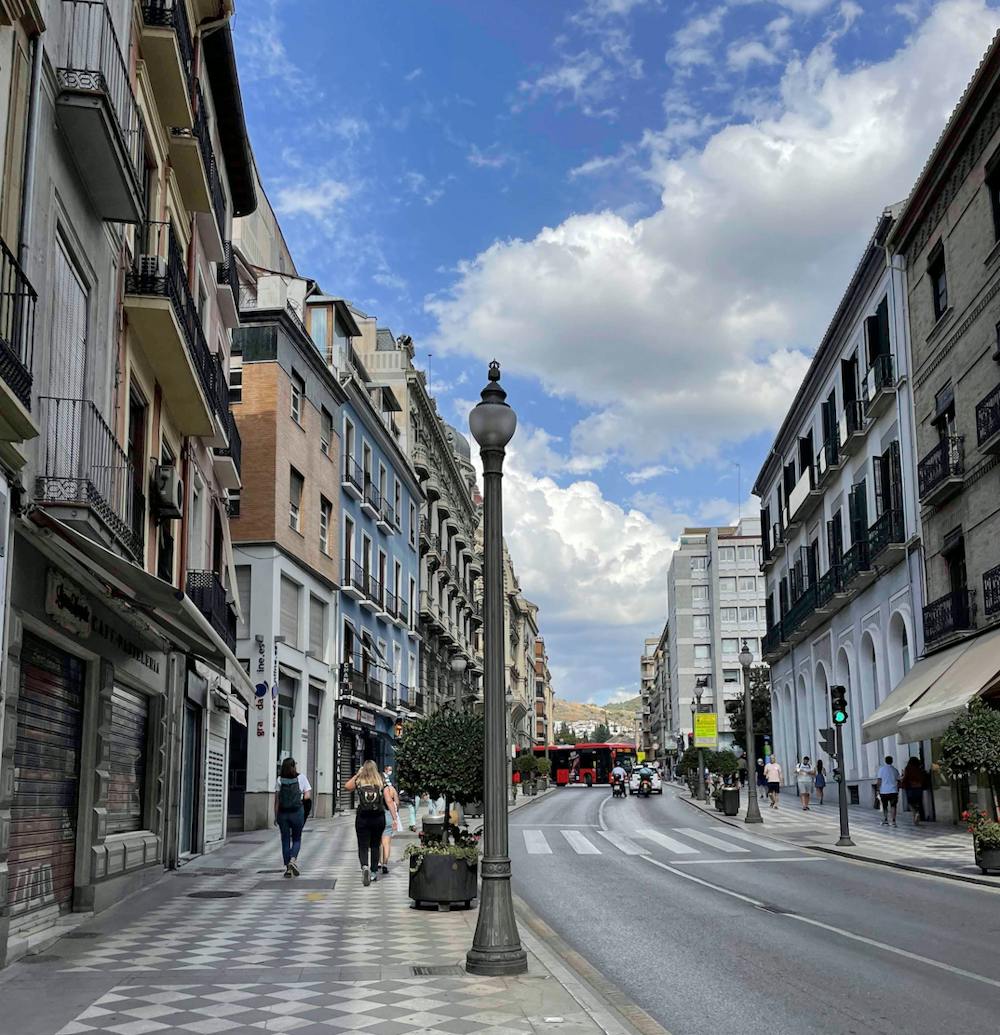
Street: On her way to school, Mayer snaps a photo of the street Reyes Católicos in Granada.
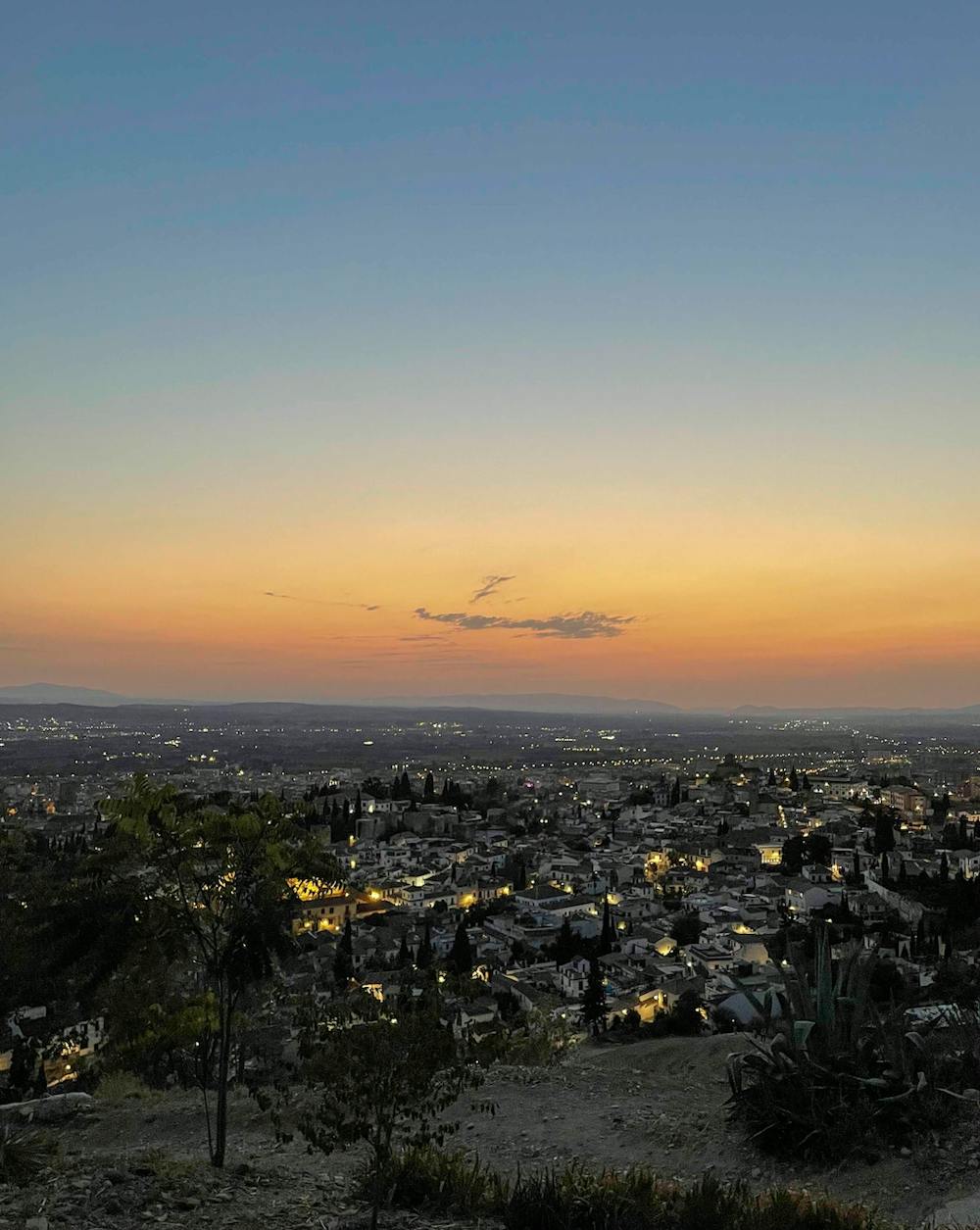
Sunset: Mayer takes a photo of a sunset city view.
Emily Bischoff ’22
Bocas Del Toro, Panamá
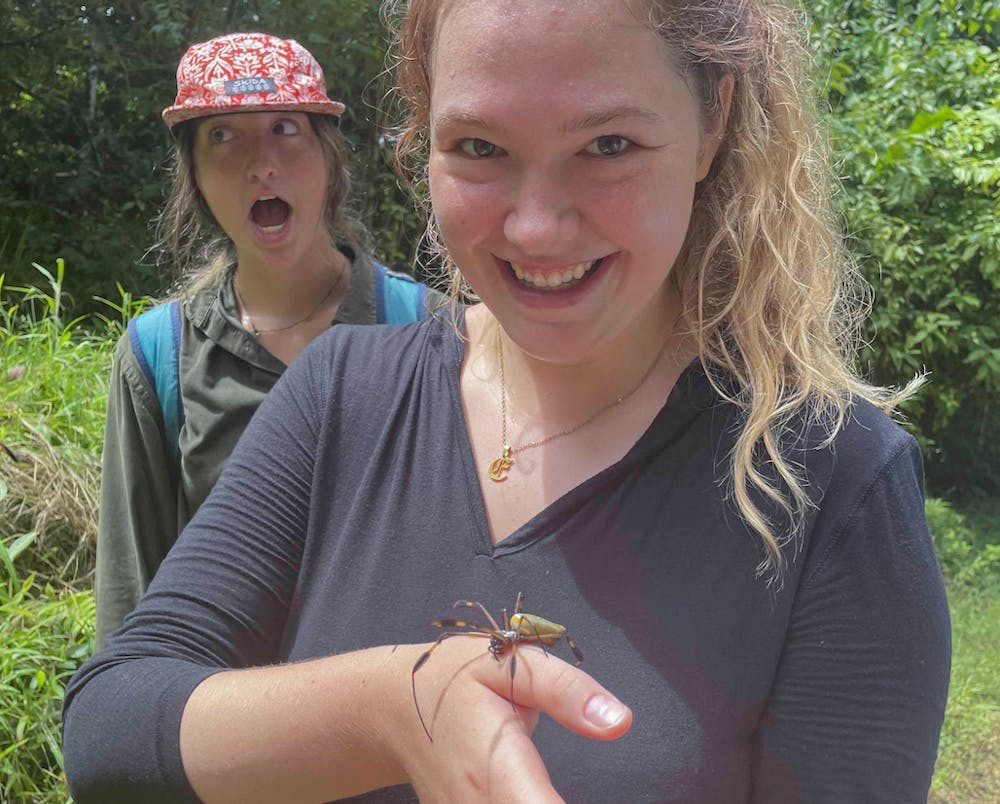
Spider: Bischoff holds a golden silk orb-weaver spider during a field trip.
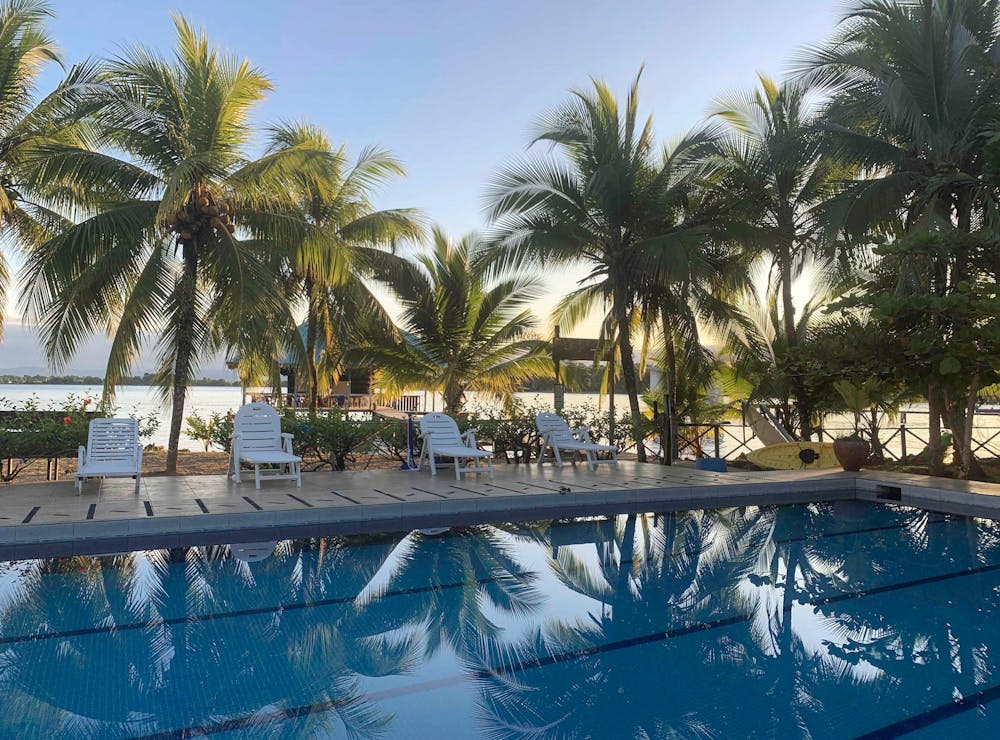
Palm trees: A photo taken on campus overlooking palm trees and the ocean.
Q: Can you tell me a little bit about the program you are in?
A: The program I’m doing is the School for Field Studies (SFS) at Panama. The program is called “Tropical Island Biodiversity Studies” and we are located in the archipelago of Bocas del Toro. We take classes about Panamanian culture and history, we study how tourism has affected the local community and [the] environment and we learn about resource management, tropical marine ecology and tropical terrestrial ecology.
Q: What are your academic interests and pursuits?
A: I am a Biology and Environmental studies double major. I am interested in environmental fieldwork and socioecological work. I was originally supposed to do the SFS Bhutan program in Fall of 2020 but it was canceled. This SFS program was obviously a huge shift from a mountainous environment in Asia to a tropical island program in Central America, but I love it! I wanted to do SFS specifically, so I could do fieldwork in an academic environment and be in a small program.
Q: What has been the most memorable aspect of your time abroad so far?
A: One of the most memorable experiences was the first time we went snorkeling. It was my first time doing it, and seeing a coral reef is a life changing experience. We have also gotten to visit several Sustainable Indigenous Tourism initiatives, which have been incredible to learn about Ngobe culture.
Q: How has COVID-19 impacted your study abroad program?
A: COVID-19 completely changed the country I’m studying in but I couldn’t be more thankful. Luckily we have still gotten to go on all of our field trips, visit Bocas town, and have [a] mid-semester break in Boquete, Panama. We still have to wear masks in town or when guests visit, but on campus we don’t have to. Overall, the COVID-19 numbers here have been really low. The vaccine has not been politicized, so once it was available for distribution everyone got it.
Q: What have you found to be the biggest difficulty or obstacle you’ve had to overcome so far?
A: Being abroad in Panama is actually my first time leaving the country. There are many cultural differences here such as notions of private property, race relations and gender dynamics.
Q: What have you enjoyed most about the country you are living in? Is there a specific part of the culture that stands out to you?
A: I love learning about the Indigenous community here, the Ngobe. They are the largest Indigenous group in Panama, and I feel like I have learned so much about agroforestry, Indigenous relations to the land and self-sustaining communities.
Q: What have you learned so far about the culture you have been immersed in (something that a tourist wouldn’t know, but a local would)?
A: Tourism has had a significant impact on the culture in Bocas, so it has been interesting to learn about the impact this has had on the community and how community members perceive [it]. Talking to community members about their relationship and perceptions on tourism has taught me how complicated tourism’s impact can be.
Editor’s note: The interviews have been edited for length and clarity.

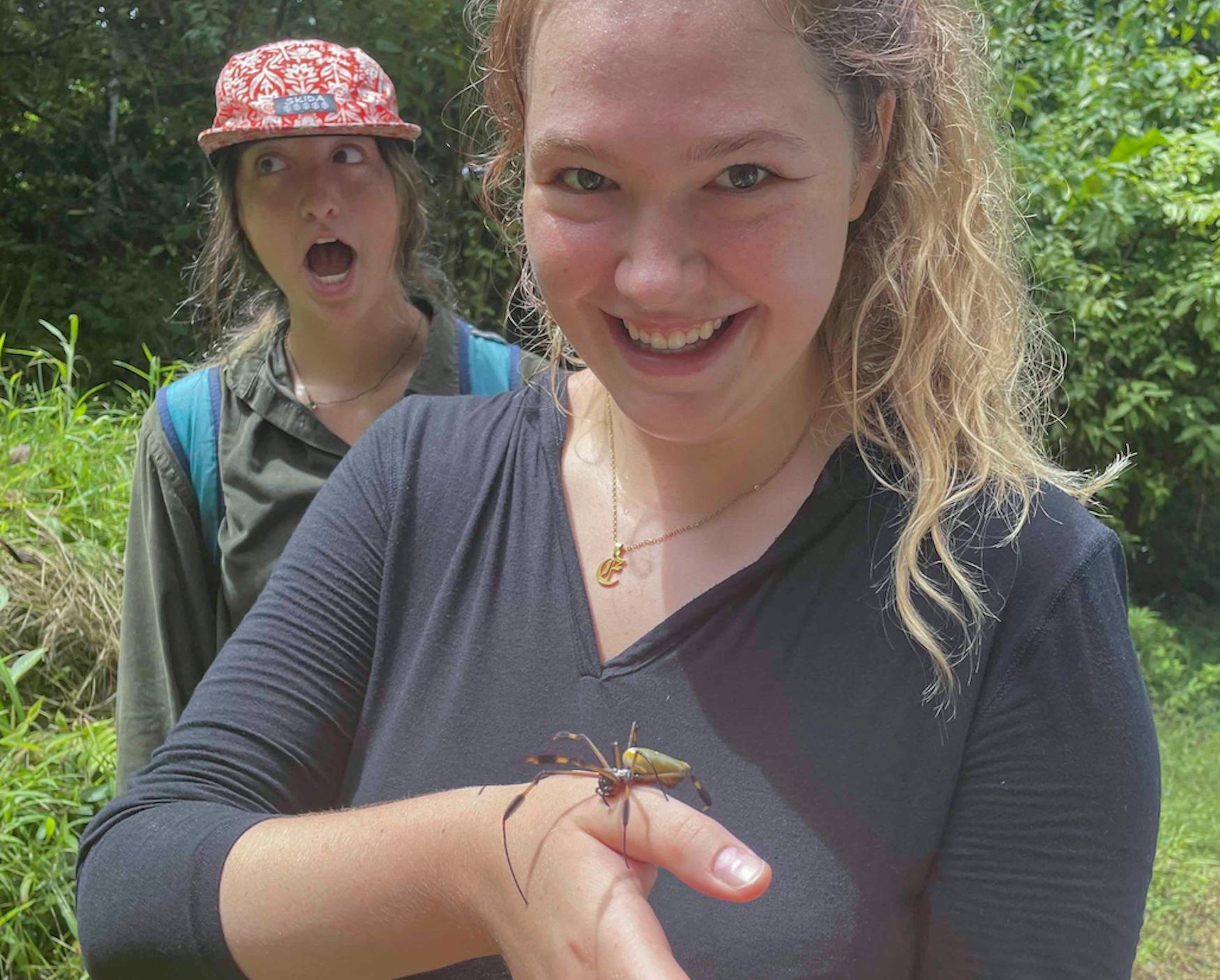

Please note All comments are eligible for publication in The Justice.